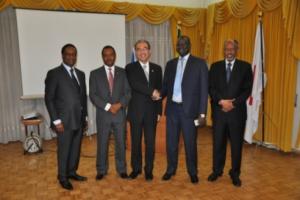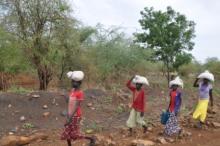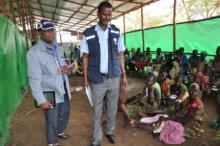Japan announces support to WFP, WHO and UNHCR to assist South Sudanese refugees and Ethiopian host community in Gambella
ADDIS ABABA - The UN High Commissioner for Refugees (UNHCR), the UN World Food Programme (WFP) and the World Health Organization (WHO) today thanked the government of Japan for its generous and timely donation of US$11.8 million to assist South Sudanese refugees and the host community in Gambella regional state in western Ethiopia.
The three UN agencies acknowledged the Japanese Ambassador in Ethiopia, His Excellency Mr. Kazuhiro Suzuki, for the crucial contribution to deliver life-saving assistance and services to refugees and the host community.
“This generous donation from the government of Japan will enable UNHCR to deliver protection and assistance to the most vulnerable of refugees. Over 90 percent of new arrivals are women and children and this funding means that we can provide them with a roof over their heads, protection and education,” said Valentin Tapsoba, UNHCR Director for the Regional Bureau of Africa.
The US$5.8 million donated to UNHCR will allow the agency to establish and develop a new camp called Jewi, where almost 50,000 South Sudanese refugees are being relocated from Leitchuor camp, which was flooded in last year’s rains. Services such as reception, registration, protection against sexual and gender-based violence, health, shelter and education will be provided thanks to this grant.
WFP received US$5 million, which will be used to provide food assistance every month for 240,000 refugees as well as school meals.
“These South Sudanese refugees depend on the food and nutrition support that we provide, and we cannot allow them to go hungry,” said Mohamed Diab, WFP’s acting country director for Ethiopia. “We are very grateful to the government of Japan for this timely and generous contribution, which will help us ensure the refugees continue to receive life-saving assistance.”
There are currently 250,000 South Sudanese refugees living in camps in Gambella and among the host community, who are generously sharing natural resources with the refugees. The burden and risk of both vaccine-preventable and communicable diseases is also high in Gambella. In order to provide health services to the vulnerable host community and refugees in the region, WHO will use its contribution of US$1 million from Japan to provide essential vaccines and build the capacity of local health workers on disease surveillance and outbreak management, infection control and management of acute malnutrition, as well as improve cold chain management.
“WHO’s partnership with Japan will help to ensure that the refugees and vulnerable host community in Gambella are protected from communicable diseases and receive the care and support that they urgently need,” said Dr. Pierre M’pele-Kilebou, WHO Representative to Ethiopia.
Ethiopia is currently home to 676,000 refugees, the highest number in any refugee-hosting country in Africa. UN agencies and NGOs are working in collaboration with the national refugee agency ARRA to provide assistance to all refugees.
For more information please contact:
UNHCR: Andy Needham, UNHCR/Ethiopia, needham [at] unhcr.org (needham[at]unhcr[dot]org), Mob. +251936010672
WFP: Stephanie Savariaud, WFP/Addis Ababa, Stephanie.savariaud [at] wfp.org (Stephanie[dot]savariaud[at]wfp[dot]org), Mob. +251 911 201 976
WHO: Viivi Erkkila, WHO/Ethiopia, erkkilav [at] who.int (erkkilav[at]who[dot]int), Mob. +251 936 811947
Photo: WHO Ethiopia/Loza M and WHO Ethiopia/V. Erkkila





